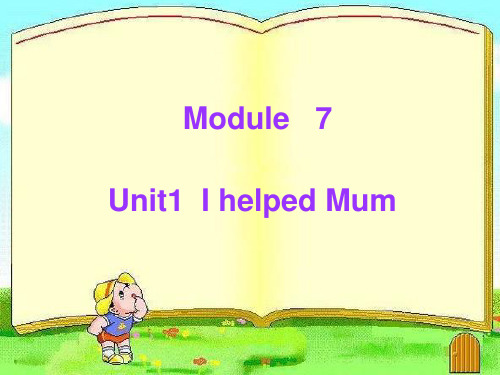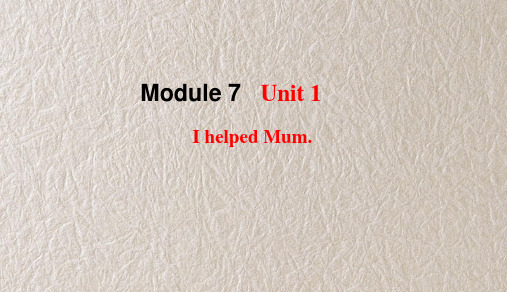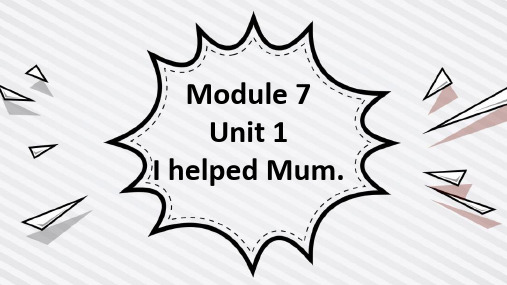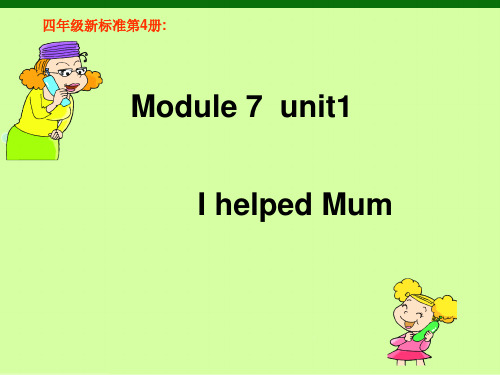外研版小学英语四年级下册 Module7 Unit1 I helped Mum 教学课件PPT
外研版(三起)-英语-四年级下册-Module 7 Unit 1 I helped Mum.精品课件

Let’s chant !
Today , today 是今天, yesterday 是昨天, one day , one day 有一天, 让我们珍惜 every day 。
Word List
• had (have的过去式)度过
• cook 烹调;煮;烧 • did (do的过去式)助动词 • didn’t=did not 没有 • Wash 洗 • computer 计算机;电脑 • love 爱 ;喜欢 • him (宾格)他 • Phone(给……)打电话 • really 真的 • What about…?……怎么样?
(3) Sam helped Mum and ________. A.watched TV B.washed clothes
Listen read and circle “True”or “False”.
(1)Grandma phoned Amy on Sunday.
(2)Amy cooked noodles. (3)Sam didn’t watch TV. (4)Sam played on the computer.
Homework:
1:用学过的过去式向家人或同 伴介绍自己上周末的活动情况:
My weekend
Yesterday, I…
2:向家人展示自己跟读模仿课 文录音的情况
I phoned my grandma yesterday.
(1)Who helped mum? ____ A.Amy helped Mum. B. Sam helped Mum.
C. Tom helped Mum.
(2) Amy cooked ________yesterday. A.noodles B. fish
外研版(三起)英语四年级下册Module 7 Unit 1 I helped Mum

Role play with your partner.
(和你的搭档进行角色扮演并展示)
Show time
Chant
What did you do yesterday? What did you do yesterday? cooked, cooked, I cooked noodles. washed, washed, I washed clothes. helped , helped, I helped Mum.
• clean the floor • water the flowers • wash vegetables • wash clothes • wash the dishes • make a cake •…
Homework
1. Read the text for 3 times. ☆
(自读课文3遍)
Helping others is helping ourselves.
(在生活中要主动去帮助家人、朋友和需要帮助的人,助人为乐是种美德)。
Tips:
Listen and circle the words with “ed”(圈出含有“ed”的动词)
What can you find?(你发现了什么?)
What about Amy?
Amy phoned grandma.
phone phoned
Listen and choose
1. Amy cooked________ . A. fish B. meat C.noodles
2. Amy washed________ . A. clothes B. the dishes(碗,盘子) C.vegetables
A :What did grandma do yesterday ? B:
四年级下册英语教案Module7Unit1Ihelpedmum

四年级下册英语教案Module 7 Unit 1 I helped mum. 外研版(三起)教学内容:本课为外研版(三起)四年级下册英语第七模块第一单元,教学内容主要围绕“帮助家人做家务”这一主题展开。
通过学习本课,学生将能够理解并运用过去时态描述过去发生的动作,如“I helped mum.”,并学会表达自己在家庭生活中承担的责任。
教学目标:1. 知识与技能:学生能够听懂、会说、会读本课单词和短语,如“cleaned the desk”, “cooked dinner”等,并能用过去时态描述自己帮助家人做的事情。
2. 过程与方法:通过图片、情景模拟等教学活动,让学生在实际语境中运用英语进行交流,提高学生的英语口语表达能力。
3. 情感态度价值观:培养学生热爱家庭、愿意帮助家人分担家务的良好品质,增强学生的家庭责任感。
教学难点:1. 过去时态的运用:学生需要理解并掌握过去时态的构成和用法,能够正确运用过去时态描述过去发生的动作。
2. 词汇的积累与应用:本课涉及的动词短语较多,学生需要通过反复练习,掌握并熟练运用这些短语。
教具学具准备:1. 教学课件:包含本课的单词、短语、句型等内容的PPT。
2. 图片素材:与家务活动相关的图片,如清洁桌面、烹饪晚餐等。
3. 角色扮演道具:模拟家庭环境的道具,如桌子、炊具等。
教学过程:1. 导入:通过展示家庭日常活动的图片,引导学生回顾已学的相关词汇和句型,激发学生的学习兴趣。
2. 新授:借助课件和图片,教授本课的新单词和短语,让学生跟读并模仿,确保学生正确掌握发音和用法。
3. 练习:设计各种游戏和活动,如“接龙”、“角色扮演”等,让学生在实际语境中运用所学知识,提高口语表达能力。
4. 巩固:通过听力和阅读练习,让学生在理解的基础上进一步巩固所学知识。
板书设计:板书将围绕本课的主题和重点内容进行设计,包括单词、短语、句型等,并通过图表、颜色等元素增强视觉效果,帮助学生更好地理解和记忆。
外研版(三起)(2012)小学英语四年级下册Module 7 Unit 1 I helped Mum

Module7 Unit1 I helped Mum.一、选出所给词语的汉语意思( )1.clothes A.衣服 B.面条 C.电脑( )2.help A.好的 B.帮助 C.加油( )3.phone A.电脑 B.电视 C.电话( )4.cook A.煮,烹 B.面条 C.饭( )5.mum A.爸爸 B.奶奶 C.妈妈二、翻译下列短语1.a beautiful day _____________2.on the lake ____________3.煮面条________________4.洗衣服______________5.What about ________________6.play on the computer___________7.看电视_______________ 8.在星期一____________三、单项选择( )1.Yesterday ______ a holiday.A.wasB.wereC.is( )2.We all ______ a very happy day.A.haveB.hadC.has( )3.________Monday Amy phoned Grandma.A.AtB.InC.On( )4.Tom is a good boy. I love _______.A.heB.himC.his( )5.He played ______the computer.A.atB.inC.on( )6.Yesterday I helped Mum and I_______clothes.A.washB.washedC.washes( )7.My grandma cooked ________ yesterday.A.noodlesB.noodleC.a noodle( )8.Today ______ a beautiful day.A.amB.isC.was( )9.I helped Mum, _______ you?A.How areB.How oldC.What about ( )10.Oh, he is a _______boy.A.goodB.betterC.well四、用所给词的适当形式填空1.He ______ (not help) mum then.2.He is a good boy. I love ______(he).3.He ______(play)on the computer yesterday.4.Mum cooked _______(noodle) yesterday.5.On last Monday Amy ________(phone)Grandma.五、连词成句1.a day beautiful was it._____________________________.2.rowed boat we on lake the a.______________________________.3.are a girl you good.______________________________.4.helped too Tom Mum.______________________________.5.help didn’t He Mum.______________________________.六、句型转换1.He helped Mum.(变成否定句)He ______ ______ _______Mum.2.You are a good girl.(用I am 改写句子)________ ________ a good girl.3.He watched TV.(变成一般疑问句)_______ he _______ TV?4.反问别人说:你呢?英语应是:_________ ________ ________?5.翻译句子We all had a very happy day._______________________________.七、情景对话,根据课文填句子A: _______!B:Hello, Grandma!A:Oh, hi, Amy!B:I cooked noodles yesterday.A:Oh, ________?B:Yes, I helped Mum and I washed clothes.A:_________________. _____________?B:Tom helped Mum too.A:Oh, he is a good boy. _____________.八、阅读理解,判断正(T)误(F)It was Sunday yesterday. It was a beautiful day. Amy helped her Mum and cooked noodles. She washed clothes, too. Sam didn’t help Mum. He played on the computer and he watched TV. Tom helped Mum too. Sam and Tom are Amy’s brothers.( )1.Today is Monday.( )2.Yesterday was a windy day.( )3.Amy and Sam helped Mum.( )4.Sam played on the computer and watched TV.( )5.Tom and Sam are Amy’s brothers.参考答案一、ABCAC二、1.美好的一天,2.在湖面上,3. cook noodles,4.wash clothes5. 怎么样6.玩电脑7. watch TV8.on Monday三、1-5ABCBC 6-10BABCA四、1.didn’t help,2.him,3.played,4.noodles,5. phoned五、1. It was a beautiful day.2.We rowed a boaton the lake.3. You are a good girl.4. Tom helped Mum too..5. He didn’t help Mum.六、1. did not help 2. I am 3. Did watch 4. What about you?5. 我们都度过了一个美好的一天。
外研版四年级英语下册Module7Unit1I_helpedMum.精品课件

Point and say:
Yesterday Grandma _c_o_o_k_e_d fish.
Yesterday Sam _p_la_y_e_d__ on the computer.
Yesterday Amy _w__a_s_h_e_d_clothes.
play on the computer watch TV play football
help Mum
Have a match:
幸运搭档
Ti2m321开1e83297654142始i3987650s421876计up时!
(每队派两人,运用所学句型展开竞猜比赛,30秒内猜对图片最多的即为获胜!)
My weekend(我的周末)
(在生活中要主动去帮助家人、朋友和需要帮助的人,助人为乐是种美德。)
2、Who is the winner?
Homework:
1、模仿课文,写写自己周末做过的事情: My weekend: Yesterday I______ . I_________ .
2、认真读课文三遍,注意读准 语音语调。
yesterday
• 15、一年之计,莫如树谷;十年之计,莫如树木;终身之计,莫如树人。2021年7月2021/7/232021/7/232021/7/237/23/2021
• 16、提出一个问题往往比解决一个更重要。因为解决问题也许仅是一个数学上或实验上的技能而已,而提出新的问题,却需要有创造性的想像力,而且标志着科学的真正进步。2021/7/232021/7/23July 23, 2021
Hello ,everyone! I’m___. Yesterday was_____. I was at______. I____________. And I__________.
英语外研新标准(三起)四年级下册-Module7 Unit1 I helped Mum教案

英语外研新标准(三起)四年级下册-Module7 Unit1 I helpedMum教案教学目标•学生能够听懂、会说、会读、会写单词:wash, dishes, make, bed, tidy, room。
•学生能够根据提示完成句子:I helped Mum wash the dishes. I helped Mum make the bed. I helped Mum tidy the room。
•学生能够听懂、会说、会读、会写句型:I helped Mum wash the dishes.I helped Mum make the bed. I helped Mum tidy the room。
教学准备•PPT课件、教学录音、单词卡片、句型卡片。
教学内容与过程1. 自我介绍教师和学生互相介绍自己的名字、年龄和家庭情况。
2. 引入新词汇通过图片和实物,介绍新单词wash, dishes, make, bed, tidy, room,并教授其发音。
3. 学生听录音跟读播放教学录音,让学生跟读单词并朗读句子。
4. 学生拼读单词将单词打乱,让学生拼读单词。
5. 单词记忆游戏教师出示单词卡片,让学生快速记忆,并在教师叫出单词时迅速举起卡片。
6. 句子填空出示句型卡片,让学生根据提示填空:I helped Mum ________ the dishes.I helped Mum ________ the bed. I helped Mum ________ the room。
7. 句子编造以“I helped Mum”为开头,让学生自行编造剩余内容的句子。
8. 句型练习教师出示图片,让学生根据图片描述:“I helped Mum wash the dishes. I helped Mum make the bed. I helped Mum tidy the room。
”教学反思通过本节课的教学,学生们成功学习了新单词wash, dishes, make, bed, tidy, room,并掌握了句型I helped Mum wash the dishes. I helped Mum make the bed. I helped Mum tidy the room。
小学英语_外研版小学英语四年级下册Module7 Unit1 I helped Mum.教学课件设计

(h伙 Actions played
football
washed clothes
did the homework
helped played cooked Mum basketball noodles
watched TV
Wang
√
lingzhe
...
Please help your mother and father.And be a good girl or boy.
he watched TV.
What about Tom?
Tom helped Mum too.
Oh , he is a good boy. I love him.
love
爱;喜欢
Read after the e-pen . 注意模仿语音语调
Let’s chant
Cook, cook,cooked, Amy cooked noodles. Wash,wash,washed, she washed clothes. Help, help, helped, Tom helped Mum. Play, play, played, Sam played on the computer. Watch watch, watched, he watched TV.
Homework
1.Read the text for two times. 2.Help your Mum or Dad do one thing.
Match and say. watched TV.
Yesterday
washed clothes.
cooked fish.
played on the computer.
四年级下册英语教案-Module7Unit1IhelpedMum

四年级下册英语教案Module7 Unit1 I helped Mum.|外研社(三起)教学内容本课为外研社《新标准英语》四年级下册第七模块第一单元,主题为“我帮助了妈妈”。
教学内容围绕日常家庭生活中的帮助行为展开,通过学习本课,学生能够理解和运用过去时态描述过去发生的事情,同时学习一些常用的动词短语,如“cleaned the desk”,“washed the clothes”等,以及询问和回答帮助行为的句型。
教学目标1. 知识与技能:学生能够听懂、会说、会读本课的单词和短语,能够运用过去时态描述自己过去帮助他人的经历。
2. 过程与方法:通过角色扮演、小组讨论等活动,提高学生的英语听说能力和合作能力。
3. 情感态度价值观:培养学生乐于助人的良好品质,增强家庭责任感。
教学难点1. 正确运用过去时态描述过去的帮助行为。
2. 单词和短语的理解和记忆。
教具学具准备1. 多媒体课件2. 教学卡片3. 角色扮演道具教学过程第一环节:热身与导入通过日常对话,询问学生昨天做了什么,引导学生用过去时态回答。
展示与本课内容相关的图片,让学生预测本节课的主题。
第二环节:新知呈现利用多媒体课件展示课文内容,教授新单词和短语。
通过师生互动、生生互动,练习新句型。
第三环节:实践与练习分组进行角色扮演,模拟家庭帮助场景,运用本课所学语言。
小组讨论,分享自己在家中帮助父母的事情。
第四环节:巩固与拓展完成课本练习,巩固所学知识。
设计“我是家务小能手”活动,让学生在家中实践所学,并记录下来。
板书设计1. Module7 Unit1 I helped Mum.2. 画出思维导图,突出重点单词和句型。
3. 以图表形式展示动词短语的构成。
作业设计1. 完成课本练习题。
2. 写一篇小作文,描述自己昨天帮助家人的经历。
3. 家长签字确认学生在家的帮助行为。
课后反思本节课结束后,教师应反思教学效果,包括学生的参与度、语言运用能力以及情感态度价值观的达成情况。
Module_7_Unit_1I helped Mum外研版英语四年级下册

Module 7 Unit 1设计科目版本小学英语(三年级起点)外研版四年级下册章节Module 7课名Module 7 Unit 1 I helped Mum.学习目标学习重难点1. 能够听懂、会说、并初步运用phone, cook, wash, I helped Mum. I cooked noodles.2. 能够运用简单动词过去式讲述发生在过去的行为。
具体环节设计教学环节内容多媒体素材素材使用意图制作要求1. 教师上课1.1热身导入1. 热身导入(1) Read the picture.Hello, boys and girls. Welcome to ourclass. Yesterday the children went to the park.Now please look at the picture, and find out whatthey did.图片:jpg024.jpgjpg018.jpg展示图片,引导学生自己提取信息。
jpg024.jpg不用点击放大。
jpg018.jpg 图片放置在英文下方,点击可放大。
1同学们好,欢迎来到我们的英语课堂,昨天孩子们去了公园,那他们做了什么呢?我们来看一看。
1. 热身导入(2) Listen and chant.What did they do? And let’s chant with the video.他们做了什么?我们跟着动画一起来说一说。
图片:jpg001.jpgjpg002.jpgflash001.jpg动画:flash001.swf通过动画复习上节课的内容,为导入新课做铺垫。
jpg001.jpg,jpg002.jpg点击不用放大。
flash001.jpg放置在英文下方,链接动画,点击可播放。
动画既能在网页中小屏播放,也能扩大至全屏播放。
21.2新知呈现2. 新知呈现(1)Watch and listen.On Monday, Amy made a phone call tograndma, talking about what she and herbrothers did on the weekend. Please watch thevideo and see what they all did.周一,Amy 给奶奶打了电话,我们来看动画,看看她和哥哥、弟弟在周末都做了什么?图片:jpg006.jpgjpg001.jpgflash002.jpg动画:flash002.swf通过动画,引入故事。
外研版四年级下册英语Module 7《Unit 1 I helped Mum.》教案

外研版四年级下册英语Module 7《Unit 1 I helped Mum.》教案一、教材分析:本节课的教材是外研版四年级下册的Module 7《Unit 1 I helped Mum.》。
该单元主要围绕谈论过去的行为展开,通过学习一些表示过去行为的单词和句型,培养学生帮助父母、做家务的好品德。
教材中包含了听说读写的综合训练,旨在提高学生的语言运用能力。
二、教学目标:1. 知识目标:能够听、说、认读单词: had, phone, cook, really, wash, What about...?, did, didn't, computer, love, him。
能够听懂并会说句子: "I helped Mum."等谈论过去的行为。
2. 能力目标:继续接触一般过去时,能够用本课所学单词和句型谈论过去的行为。
3. 情感目标:学会帮助父母,做一些自己力所能及的家务,培养良好的家庭责任感和品德。
三、教学重点和教学难点:教学重点:用本课所学单词和句型谈论过去的行为。
教学难点:灵活运用行为动词的过去式,并能结合自身实际情况进行正确表达。
四、学情分析:学生是四年级的学生,他们已经学习了一些基础的英语知识,包括动词的基本用法和一般现在时。
他们对过去时的概念可能还不是很清楚,因此需要引导他们理解过去时的用法。
在学习过程中,学生的动手能力和语言表达能力还比较有限,需要通过大量的口语练习和互动来巩固所学的知识。
五、教学过程:Step 1: Warm-upGreet the students and briefly review the previous lesson by asking questions related to household chores. For example, "Who can tell me a chore you did at home last week?"Show pictures of different household chores, such as cooking, cleaning, and washing, on the board or using flashcards. Ask the students if they help their parents with these tasks and how they feel about it. Encourage them to share their experiences and feelings.Teacher: "Good morning, everyone! Let's start our lesson by talking about the chores you did at home last week. Who can share their experience with the class? Raise your hand, please."Step 2: PresentationIntroduce the new words "had," "phone," "cook," "really," "wash," and "What about...?" by presenting them on the board or using flashcards. Teach the pronunciation and meaning of each word, and have the students repeat after you.Use gestures or real objects to help students understand the meanings of the words. For example, act out cooking or washing to demonstrate the actions.Present the sentence pattern "I helped Mum" and explain that it talks about past actions. Model the pronunciation and intonation, and have the students repeat after you.Teacher: "Now, let's learn some new words. Repeat after me: had, phone, cook, really, wash, What about...? Great! Now, let's practice the sentence pattern 'I helped Mum.' Repeat after me: 'I helped Mum.'"Step 3: PracticeGive examples of past actions using the new words and sentence pattern. For example, say, "Yesterday, I had a phone call. I helped Mum cook dinner. I really enjoyed it." Encourage students to listen and repeat the sentences.Divide the class into pairs or small groups. Ask them to take turns sharing their own past actions using the sentencepattern. For example, "Yesterday, I helped my dad wash the car." Monitor their conversations and provide assistance when needed.Conduct a class discussion and ask students to share their partners' past actions. Encourage them to ask questions such as "What did you do yesterday?" and respond using the sentence pattern.Teacher: "Now, let's practice using the new words and sentence pattern in conversations. Turn to your partner and take turns sharing your past actions. For example, 'Yesterday, I helped my mom cook dinner. What about you?' Start practicing now. I will walk around and listen to your conversations."Step 4: ConsolidationPlay a game called "Guess the Action." Show pictures of different actions or chores on the board or using flashcards. Describe the action in the past tense, and have students guess the action. For example, say, "Yesterday, I cooked a delicious meal. What did I do?" Students can respond with "You cooked."Review the past tense forms of the verbs and their meanings. Write the verbs on the board and elicit the past tense forms from the students. Practice pronunciation and repetition of the verbs.Teacher: "Now, let's play a game called 'Guess the Action.' I will describe an action in the past tense, and you need to guess the action. For example, 'Yesterday, I cooked a delicious meal. What did I do?' Raise your hand if you know the answer."Step 5: ApplicationProvide a worksheet or a writing activity where students can apply their learning by writing about their own past actions. For example, they can write sentences like "Yesterday, I helped my mom clean the house" or "Last week, I washed my dad's car." Encourage them to use the new words and sentence pattern in their writing.After completing the writing activity, ask some students to share their sentences with the class. Provide positive feedback and correct any mistakes if necessary.Teacher: "Now, it's time to apply what we've learned. Please take out your worksheet and write about your own past actions. Use the new words and sentence pattern we learned today. Raise your hand when you're finished, and I will call on a few students to share their sentences with the class."Step 6: Wrap-upReview the key vocabulary words and sentence pattern by playing a quick game of "Simon Says." Give commands using thepast tense and have the students follow the actions. For example, say "Simon says, 'Wash your hands'" or "Simon says, 'Cook a meal.'"Summarize the lesson by highlighting the importance of helping family members and doing household chores. Reinforce the idea that these actions contribute to a happy and harmonious family.Teacher: "To wrap up our lesson, let's play a game of 'Simon Says' to review the key vocabulary words and sentence pattern. Listen carefully to my commands and follow the actions. Remember, we help our family members by doing chores and createa happy home. Great job, everyone!"六、板书设计:[Title: Unit 1 I helped Mum.]Vocabulary: had, phone, cook, really, wash, What about...?Sentence Pattern: I helped Mum.Verbs: cook, wash, lovePast Tense Forms: cooked, washed, loved七、教学反思:本节课通过引入新的过去时词汇和句型,帮助学生学会谈论过去的行为。
外研版英语四下Module 7 Unit 1 I helped Mum课件

I helped Mum.
had /hæ d/(动词)(have的过去式)度过 短语:have a good/great time玩得高兴;过得愉快 形近词:hat 帽子 例句:I had a great time in London.
我在伦敦度过了一段美好的时光。
phone /'fəʊn/(动词)(给……)打电话 发音:字母o在单词phone中发/əʊ/音。 例句:Can you phone me tonight?
返回课文
Exercise
一、给下列汉语选择正确的图片。
A.
B.
C.
D.
( D )1.I cooked noodles yesterday. ( C )2.I washed clothes. ( B )3.He played on the computer. ( A )4.He watched TV.
yesterday(昨天),last year(去年),two hours ago(两小时前),just now(刚才),等等。 eg: Last Sunday my sister flied a kite in the park. 上个星期日我的妹妹在公园里放风筝。
返回课文
Grammar
2. What about Sam?萨姆怎么样?
Yesterday Grandma cooked fish.昨天(外)祖母做鱼肉了。
根据图片用过去 式进行描述。
课文讲解
4 Practise.
Yesterday Grandma cooked fish.
Yesterday Sam played on the computer.
根据图片用过去 式进行描述。
外研版四下Module 7 Unit 1 I helped Mum

知识精讲
句型结构:主语+动词过去式+其他. 例句:Bill played football yesterday. 比尔昨天踢足球了。 Amy went to Tianjin last Sunday. 埃米上周日去天津了。
知识精讲
知识点 6 What about Sam? 萨姆怎么样? 句型: What about...? ……怎么样? 用法: 寒暄时用作承接上下文的转折语,询问对方同样的事情。what about
之后一般跟名词、代词或动名词。 例句:I often go to work on foot. What about you?
课文学习
Yesterday was a holiday. It was a beautiful day. We rowed a boat on the lake. We all had a very happy day.
知识精讲
知识点 1 We rowed a boat on the lake. 我们在湖面上划船了。 含有实义动词的一般过去时的陈述句
过去时,所以后一分句也要用一般过去时,have的过去式是had。
知识精讲
wash /wɒʃ/ v.(动词)洗 例句: I always wash my hands before meals.
我总是在饭前洗手。 形近词: was(is,am 的过去式) 短语: wash clothes 洗衣服 wash the car 冲洗汽车 过去式: washed
我经常步行去上班。你呢?
知识精讲
外研版四年级下册Module7--Unit1-I-helped-Mum

写出下列单词的过去式。
help ( helped ) phone ( phoned ) cook ( cooked ) wash ( washed ) do ( did ) watch ( watched ) have ( had ) row ( rowed ) am ( was ) are ( were )
What about…?
…怎么样?
What about Sam?
He didn’t help Mum.
He played on the computer and
he watched TV.
didn’t = did not
没有;其中did是助动词do的 过去式,
What about Tom?
Tom helped Mum too.
1.I cooked nooldes yesterday. 2.I helped Mum 3.I washed clothes. 4.He didn't help Mum. 5.He played on the computer and he watch TV 6.Tom helped Mum too 7.I love him.
had phone cook did really wash didn’t=did not What about…? computer love
Read
I cooked noodles yesterday . He didn’t help Mum. He played on the computer.
(had/haved) a happy day
yesterday. They are (having/ had) a
happy day now.
外研版四年级下册第七模块第一单元I_helped_my_mum

She played on the computer yesterday.
Did she play on the cmputer?
Yes ,she did.
He played football yesterday. Did he play pingpang yesterday? No,he didn`t
He helped Mum.
B 1. Grandma_______.
A. cooked meat B. cooked fish
B 2. Grandma and grandpa _____.
A. watched TV B. walked in the park.
A 3. Amy_______
A. helped mum B. cooked fish A 4. Sam ______________ A. played on the computer B. played football
四年级新标准第4册:
Module 7 unit1
I helped Mum
walk in the park
play basketball
talk with friends
play on the computer
watch Tv
phone grandma
Cook meat
cook fish
help Mum
Listen to music
play table tennis
fly kites
• Today is Monday.
was •Yesterday ____Sunday.
Today, today ,a nice day Yesterday, yesterday , a nice day Every day , every day , a nice day!
- 1、下载文档前请自行甄别文档内容的完整性,平台不提供额外的编辑、内容补充、找答案等附加服务。
- 2、"仅部分预览"的文档,不可在线预览部分如存在完整性等问题,可反馈申请退款(可完整预览的文档不适用该条件!)。
- 3、如文档侵犯您的权益,请联系客服反馈,我们会尽快为您处理(人工客服工作时间:9:00-18:30)。
took带走 book书
知识点 5 Yes, I helped Mum and I washed clothes. 是的,我帮助妈妈并且我洗衣服了。
and 连接的并列句 用法:and 连接的并列句中,前后的时态要保持一致。
典例 用所给动词的适当形式填空。 I cooked rice and I had ( have)it.
( B )(3)他玩电脑了。 A. He play on the computer. B. He played on the computer.
本节课我们学习了以下知识,请同学们一定加 强巩固,以便能和同学们进行灵活交流哦!
重点词汇:had, phone, cook, wash, computer, love, him 重点短语:row a boat, on the lake 重点句式:We rowed a boat on the lake.
Do you help your Mum to do housework?
Yesterday was a holiday. It was a beautiful day. We rowed a boat on the lake. We all had a very happy day.
知识点 1 We rowed a boat on the lake. 我们在湖面上划船了。
2. Amy her mother C yesterday.
A. phones
B. phone
C. phoned
点拨:因句中有明显的表示过去的时间状语yesterday, 所以要用动词的过去式phoned,故选C。
3. —It’s a nice day. What are we going to do ?
三、根据汉语意思选择正确的句子。 ( A )(1)前天萨姆没有帮助妈妈。
A. Sam doesn’t help Mum the day before yesterday. B. Sam didn’t help Mum the day before yesterday.
( A )(2)去划船怎么样? A. What about going to row a boat ? B. What about row a boat ?
知识点 3 phone /fəʊn/ v.(动词)打电话
一词多义: phone n.(名词) 电话= telephone 同义词:call 用法: phone + 某人意为“给某人打电话” 过去式: phoned
动词过去式的变化规则(二):
以不发音的字母e结尾的动词在词尾直接加d。 例如:live—lived,like—liked,phone—phoned
Yesterday Grandma cooked fish.
最佳解说员 你的家人昨天都干什么了?快来向你的同伴介绍一下吧! 看看谁是最佳解说员!
一、单项选择。
1. My father B to music last night.
A. listens B. listened
C. listen
点拨:此题考查含有实义动词的一般过去时态的用法。 由时间状语last night可知,动词需用过去式, 所以排除A、C。故选B.
我经常步行去上班。你呢?
拓展 “What about... ?”的其他用法: (1)向对方提出建议或请求。例如:What about going out for a walk?出去散散步好吗? (2)询问对方的看法或意见。例如:What about her playing the violin?(你认为)她的小提琴 拉得怎么样?
知识点 7 He didn’t help Mum. 他没有帮助妈妈。
考向:该句是含有实义动词的一般过去时态 的否定句,其基本结构为“主语+didn’t+动词原形 +其他.” didn’t是 didnot 的缩写形式。
例句:I didn’t go to school yesterday. 昨天我没有去上学。
过去式: washed
知识点 6 What about Sam? 萨姆怎么样?
句型: What about...?
……怎么样?
用法: 寒暄时用作承接上下文的转折语,询问对方同
样的事情。what about 之后一般跟名词、代词
பைடு நூலகம்
或动名词。 例句:I often go to work on foot. What about you?
典例
He didn’t ___A___ his clothes yesterday. Mum washed them.
A. wash
B. washed
C. washing
点拨: 由yesterday可知句子为一般过去时态,又由 didn’t 可知其后动词要用原形,故选A。
知识点 8 computer /kəm΄pjuːtə(r)/ n.(名词)电脑, 计算机
Yes,I helped Mum and I washed clothes. What about Sam? He didn’t help Mum.
1 熟记本节课所学的句型、短语和单词,必须会 听、说、读、写。
2 将Listen, read and act out的对话朗读流利。
3 完成配套的课后作业。
含有实义动词的一般过去时的陈述句
考向: 在一般过去时态的句子中常有表示过去的时间状 语,如yesterday,last Sunday,last year,the day beforeyesterday 等。
句型结构:主语+动词过去式+其他.
例句:Bill played football yesterday. 比尔昨天踢足球了。 Amy went to Tianjin last Sunday. 埃米上周日去天津了。
Module 7
11111111111111111111111111111111111111111111111111111111111111111111111111111
111111111111111111111111W111Y111四11年11级111下11册1111111111111111111111111
—What about B ?
A. go swimming B. going swimming C. go swim 点拨:what about之后要跟名词、代词或动词的-ing形 式,所以选B。
二、用所给单词的适当形式填空。 1. Do you love playing (play) computer games? 2. I had a very happy day with him (he).
点拨:此句是and连接的并列句,前后的时态要一致。 前一分句用了一般过去时,所以后一分句也要 用一般过去时,have的过去式是had。
wash /wɒʃ/ v.(动词)洗 例句: I always wash my hands before meals. 我总是在饭前洗手。
形近词: was(is,am 的过去式) 短语: wash clothes 洗衣服 wash the car 冲洗汽车
知识点 4 cook /kʊk/ v.(动词)烹调;煮;烧
例句:They are cooking supper. 他们正在做晚饭。
发音: 字母组合oo 发的是/ʊ/ 音。 短语: cook noodles 煮面条 一词多义: cook n. 名词,厨师
谱系记忆法: ook
cook烹饪
look烹饪
知识点 2 had /hæd/ v.(动词)有,吃,度过 (have 的过去式)
例句:He had a very happy day. 他度过了很快乐的一天。 I had bread for breakfast today. 我今天早饭吃了面包。
发音:字母a 发/æ/ 音。 形近词:bad 坏的
Grandma: Hello? Amy: Hello, Grandma! Grandma: Oh, hi, Amy! Amy: I cooked noodles yesterday. Grandma: Oh,really? Amy: Yes,I helped Mum and I washed clothes? Grandma: You are a good girl. Grandma: What about Sam? Amy: He didn’t help Mum. He played on the computer and he watched TV. Grandma: What about Tom? Amy: Tom helped Mum too. Grandma: Oh,he is a good boy. I love him..
动词过去式的变化规则(一):
一般直接在词尾加ed。例如:play—played, cook—cooked,walk—walked,look—looked
row a boat 划船 例句: I will row a boat tomorrow. 我明天将要去划船。
on the lake 在湖面上 例句: There is a small boat on the lake. 湖面上有艘小船。
例句:Sam played on the computer the day before yesterday. 前天萨姆玩电脑了。
短语: play on the computer 玩电脑 play computer games 玩电脑游戏
知识点 9 I love him. 我喜欢他。 love /lʌv/ v.(动词) 爱,喜爱 例句: I love my mother. 我爱我的妈妈。 发音: 字母 o 发/ʌ/ 音。 形近词: live 居住 近义词: like 喜欢 短语: love to do sth. 喜爱做某事
